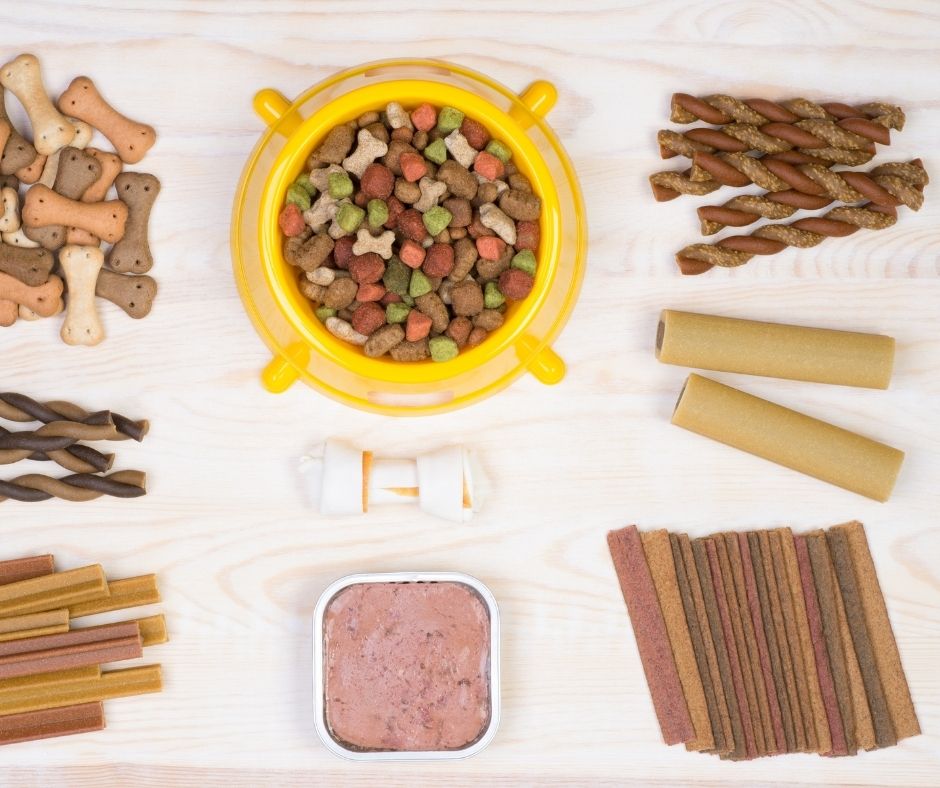As German Shepherd owners, the main aim we have is to make sure our dogs have the best start in life which starts with nutrition. So it is essential that we know how to feed a German Shepherd puppy the right way to ensure it grows into a happy healthy German Shepherd Dog.
Understanding Your German Shepherd Puppy’s Development
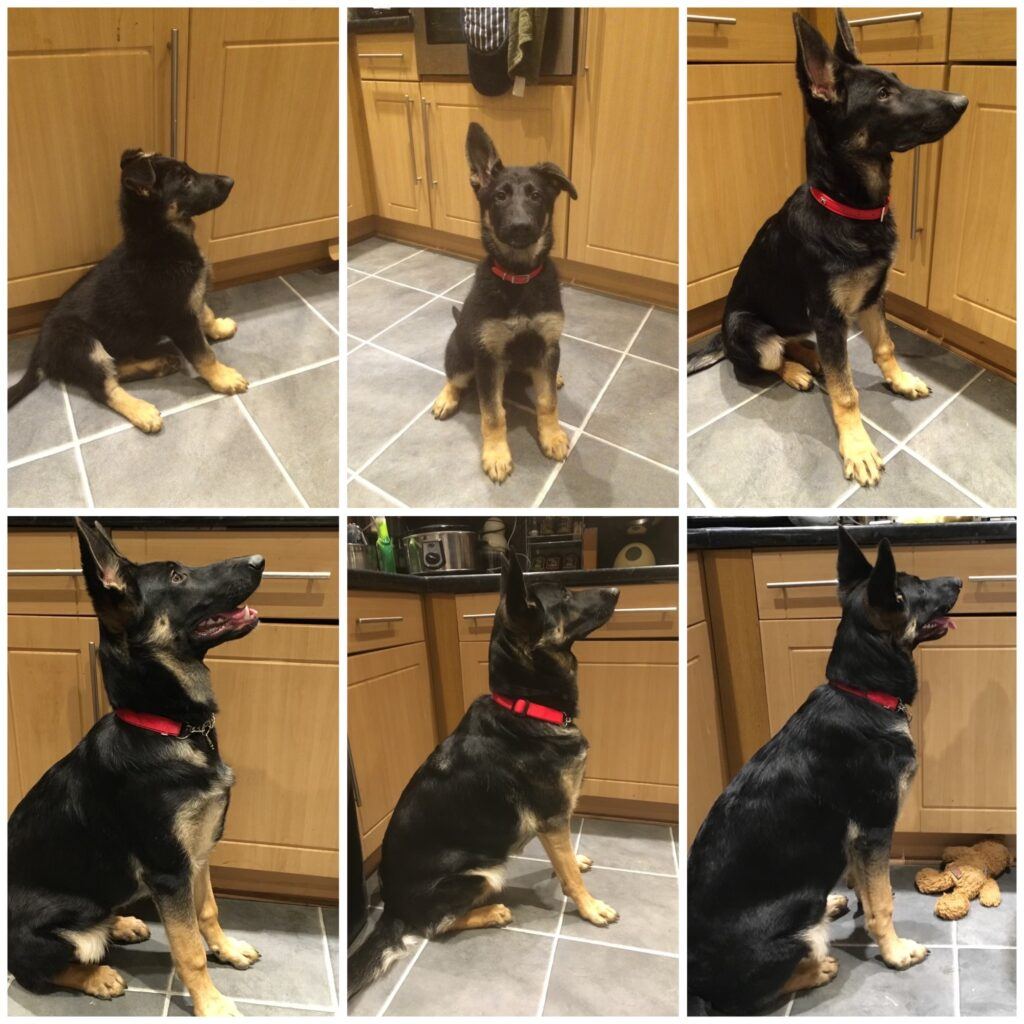
Most puppies enter our home at around 8 weeks old. Before this, the foundations of their nutritional needs have been met primarily by their mother’s milk. The breeder will then have introduced solid food into their diet upon weaning.
A medium to large breed dog like the German Shepherd grows at a much slower rate than smaller breeds. They have larger bones which need a longer time to develop and it is important that this process is not speeded up.
The First 12 Months
The speed of growth is quite rapid in the early months of your German Shepherd puppy’s life. During this period you will see them go through many growth spurts which are usually noticeable by an increase in appetite. Unfortunately, this means they don’t remain that tiny bundle of fluff for long. Although this is rewarded by watching your little clumsy puppy turn into a beautiful young dog.

Many also go through a stage of appearing to have legs that appear too long for their bodies with donkey type ears. Don’t worry though they will soon grow into those ears and their bodies will catch up with the length of their legs soon enough too.
From 12 to 18 Months
You will notice that their growth slows down considerably after 12 months of age. They are also likely to reach their full height around 18 months of age when their growth plates close. They will continue to fill out and develop muscle for at least another 6 months.
Some dogs take a little bit longer and it is not unheard of for a German Shepherd to not reach their full adult size for another 12 months or so. Although in most cases you are likely to have a fully grown adult German Shepherd by your side after 2 years.
What To Feed A German Shepherd Puppy
It is important that a German Shepherd puppy is given dog food that has been formulated to meet the nutritional needs of a medium to large breed dog. This will ensure that your puppy grows at the correct speed and develops strong bones.
As is the case with all dogs they need a well rounded balanced diet to grow and maintain their health. Proteins, carbohydrates and fats are the 3 essential parts of your dog’s diet. Although vitamins, minerals fatty acids and roughage are also needed for balanced nutrition.
Puppy food designed for small breed dogs will have too many calories per portion. This can result in your German Shepherd puppy either growing too quickly or putting on too much weight. Adult food will have too few calories per portion resulting in your puppy being undernourished.
Also, the vitamin and mineral contents will not be correctly balanced either. It is essential that you feed a complete dog food that is age and breed size appropriate.
What Is A Healthy German Shepherd Diet Plan
Fortunately, we don’t have to be nutritionists to develop a healthy German Shepherd diet plan for our puppies. The large commercial dog food companies have already done the hard work for us.
However, the pet food industry is huge with each manufacturer fighting for their piece of the market and your money. The quality of food also varies so it is important to do a bit of homework and understand the labels.
So how do we know what to choose when there are so many different brands on the market fighting for our attention.
How To Read Dog Food Labels
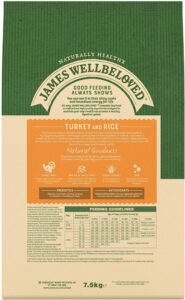
As is the case with human food pet food is regulated and there are certain pieces of information that need to be included on the labels.
One of the most important things you need to look for is whether the product has been approved by the Association of American Feed Control (AAFCO). The equivalent in the UK and Europe is the FEDIAF and there will be similar organisations in other countries.
To comply with this Pet food manufacturers must include a statement on the label. This statement will let you know if the diet is complete and balanced for your dog and its life stage or if it is only intended for intermittent feeding. It will also let you know which method was used to meet this. It will either be through feeding trials or by formulating the ingredients to provide a level of nutrients that meet an established AAFCO profile.
In the UK and Europe, there should be a statement where it says if the food is either complete (for the dog and its life-stage) or complementary (treats).
Also in the UK reputable manufacturers are members of the Pet Food Manufacturers Association (PFMA). This organisation ensures that its members meet the standards.
If you can’t find a statement on the packaging that says complete food for the age and life stage of your puppy then simply avoid it.
Check The Food is Appropriate For Your Puppy’s Age
The next thing you need to make sure of is that the food is formulated for large breed puppies. As stated above large breed puppies do have different nutritional needs than adult dogs and small breed puppies.
Some manufacturers have specially formulated puppy food designed for medium to large breed dogs from 6 to 8 weeks. They will continue to be fed this puppy food until they are around 18 months old.
Others have diet plans designed for medium to large breed dogs. This usually involves feeding their puppy food formula for a couple of months during your puppy’s early development. You then switch to a lower calorie junior food around 6 months old before transitioning onto adult food at 18 months to a year old.
Either is ok as long as you read the packaging and follow the designed feeding plan which that manufacturer is recommending for your dog’s life stage.
If you choose a brand that has a feeding plan which requires you to transition onto junior food then make sure you don’t continue with the puppy food for too long. As stated above the high-calorie content could result in your puppy growing too fast or gaining too much weight. This can cause bone density or joint problems for your puppy later in life.
Beware of Marketing Hype
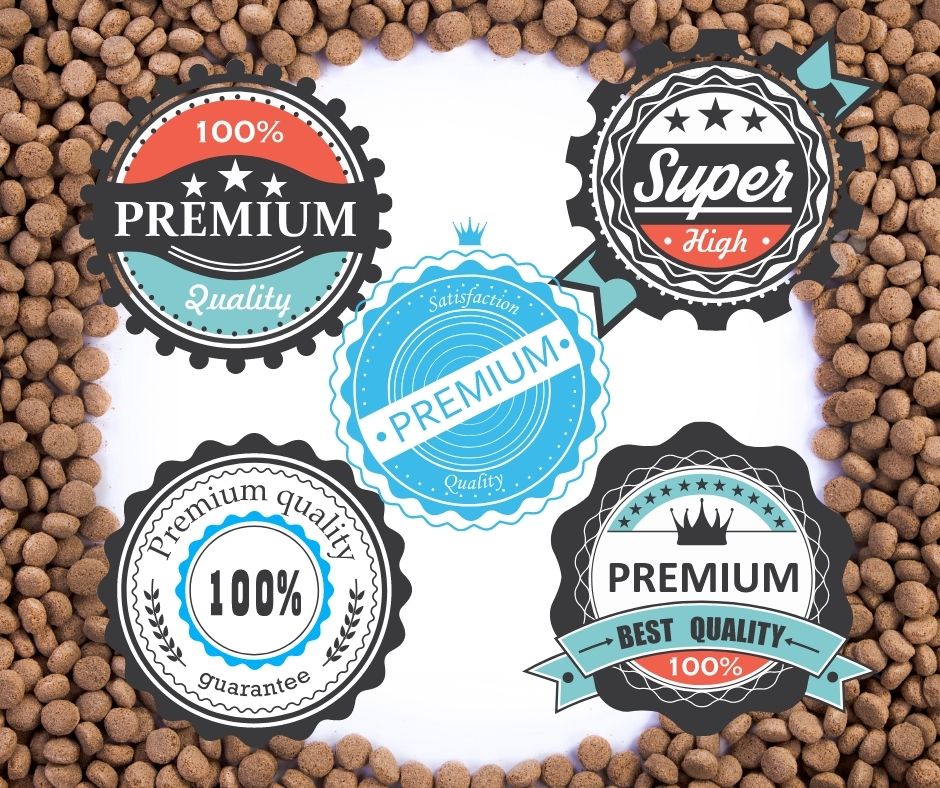
You will find that most of the commercial brands of dog food found in reputable pet stores comply with the regulations. They will therefore meet the minimum nutritional requirements but it does not mean to say they are all of the same quality.
It is also important not to get drawn in by a lot of the marketing hype used by manufacturers. Words such as premium, super-premium or gourmet do not mean that the food is superior to the one on the shelf next to it. Foods labelled this way are designed to sell the product to you. They are not required to contain any higher quality ingredients or have any better nutritional standards applied to them. So many will not be better at all.
What To Look For In A Quality Food
When looking for quality food it is important to look for companies that use high-quality ingredients and foods that exceed AAFCO guidelines. Another indicator is to choose foods with meat-based items listed as the first two to three ingredients. Avoid any that contain excessive chemicals or fillers such as wheat and soy. Just be aware that the water content of food can alter the percentage ratios of ingredients too.
It is not unusual to see manufacturers implying that their food is better than a competitor because it contains a higher percentage of meat. Before you accept their word compare the water content of the two foods and take it out of the equation. You may then find that the one claiming to have a higher content of meat is actually the one that contains the least.
So provided you have chosen a quality food that meets the above requirements then you have a healthy German Shepherd diet plan.
German Shepherd Wet Food Diet
Commercial wet dog food usually comes in cans, trays or pouches depending on the brand. It can be used as a complete food or as a topper mixed with dry food to add variety and flavour. As the food is usually about 80% water content the volume needed to be fed throughout the day will be greater and wet food is normally more expensive.
Home-Cooked Dog Food
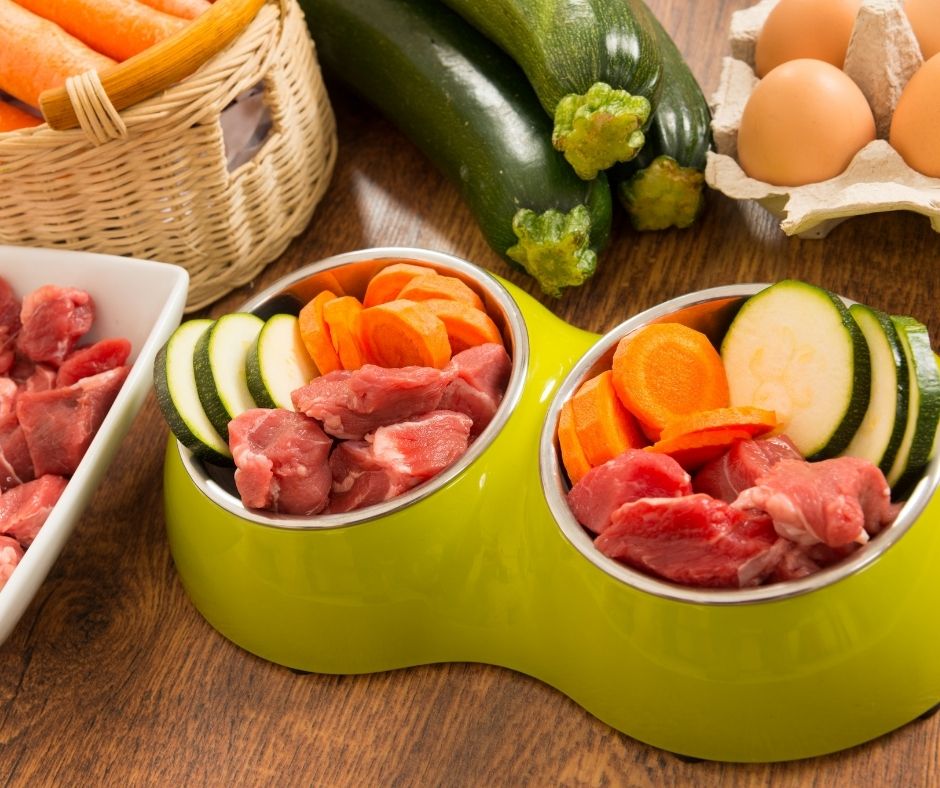
This is still a wet food diet but as its name suggests is cooked at home. Dogs have different nutritional needs based on age and breed and it is very easy to get it wrong. Commercial foods are tested to make sure that they are complete and balanced and it is not possible to do this with home-cooked meals.
It is therefore not recommended to feed your dog a home-cooked diet unless it has been formulated by a veterinary nutritionist. Even then your pet will need to be monitored over a period of time. Please do not be tempted to simply follow recipes people have posted online. These may have been posted in good faith but it is detrimental to our dogs’ health if their nutritional needs are not met with a complete balanced diet.
German Shepherd Raw Food Diet
A raw food diet, sometimes call the BARF Diet is also a form of wet dog food. There are a lot of people who believe that this is the most natural diet for your dog although the theory is not backed by science. There are few vets who recommend it and there are also some concerns over bacteria from raw food causing health issues.
I know there will be many who disagree with me but I am not a personal fan of it. I tried it once upon a recommendation from a friend when one of my dogs was being a bit fussy with her food. As it happens she didn’t like it but I also found it didn’t smell too great and it was difficult to store. This was especially so if you have a dog that doesn’t eat it all up instantly. I was also worried that I wasn’t meeting her dietary needs so it didn’t last long for me.
If you choose to feed this type of diet then I would strongly recommend that you choose a high quality commercially prepared one. This will have been tested to meet the nutritional requirements rather than trying to make up a recipe yourself. Also, take extra care when preparing the food and picking up your dog’s stools as there is a higher risk of bacteria contamination with raw meat.
German Shepherd Dry Food
Dry dog food is a commercially prepared complete meal usually sold in dried bite-size biscuit form.
I have also seen some that look a bit like a chunky dried soup mix. You just need to add water to this to rehydrate it into a wet meal. I tried it once during the fussy phase mentioned above but I cannot say I was impressed with it at all. Neither were the dogs it was very expensive and ended up in the bin.
I tried to find it to show you what it was but can’t remember its name sorry. I will update this post if I remember.
Kibble
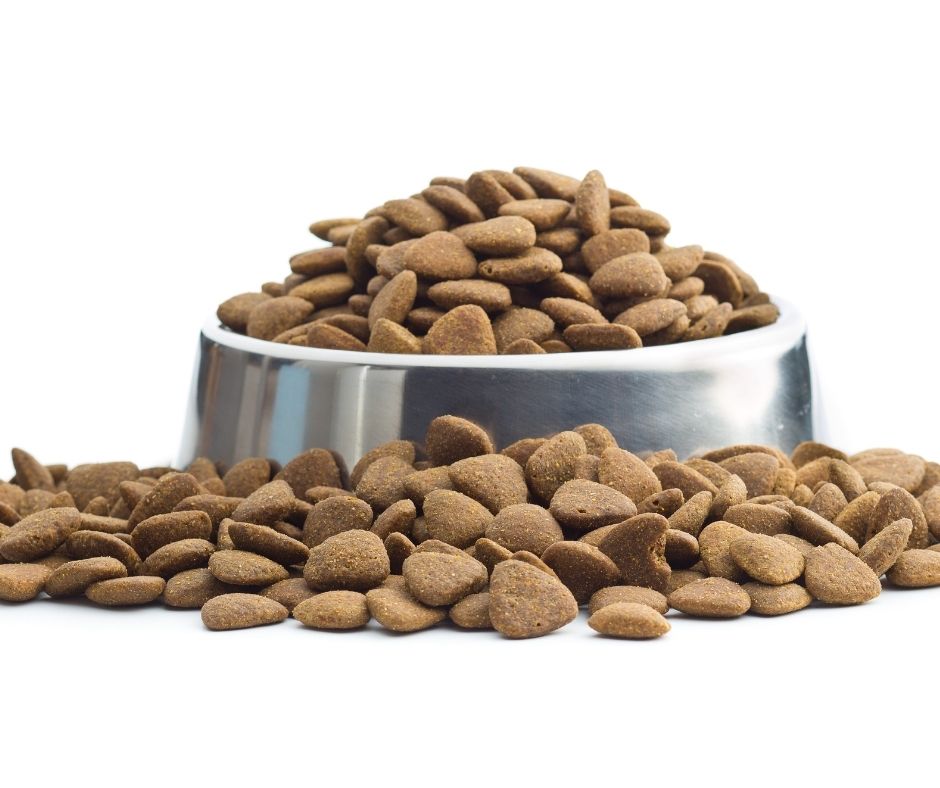
The most common dry dog food is in biscuit form and is often referred to as kibble. It is highly processed but good quality brands contain high-quality ingredients which many dogs seem to enjoy.
They are sold in bags of different sizes with many brands also having specially prepared products for different stages of your dog’s life.
Dry dog food must be fed with lots of freshwater as it does not have the same water content as wet food. The volume of food they are given is also much smaller.
It is possible to top the food with a little bit of wet food for interest and flavour if you want to and it is definitely much easier to feed and store.
What Is The Best Food For German Shepherd Puppies
Without a doubt, the best food for German Shepherd puppies is high-quality dry dog food (kibble) that is designed for medium to large breed dogs. Despite it being more user friendly and convenient it is actually better for large breed dogs that have a slower growth rate. As stated above wet food contains 80% water so the volume needed to provide the same calories is so much greater.
German Shepherd dogs are also prone to getting bloat. This is an extremely painful and serious life-threatening condition that can be caused by overfeeding.
How Did I Find The Best Food For My German Shepherd Puppies?
I just asked my vet who happened to recommend the exact same brand that my breeder had been using anyway. Your breeder and vet are the best people to help you and then get the best quality food you can afford that is also locally available.
The foods I would recommend are:
James Wellbeloved (UK)
Royal Canin Large Breed Puppy Formula Purina Pro Plan Large Breed Puppy Formula
Hill’s Science Diet Large Breed Puppy
How Much To Feed A German Shepherd Puppy
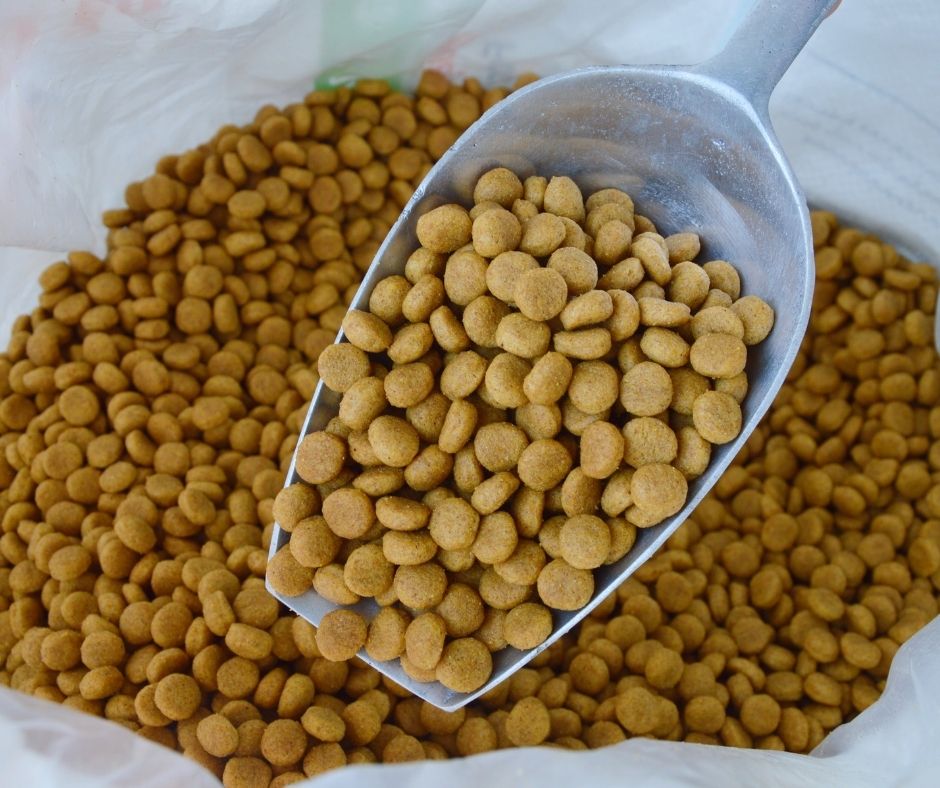
The chart below will give you a general idea of what you should feed a German Shepherd puppy but please remember this is a guide only. The amount you feed will depend upon the brand of food you buy, your puppy’s age, weight and energy levels.
First of all read the label on food packaging. All quality brands have a feeding guide printed on the packing which you can reference.
You should also monitor your puppy. German Shepherds are not generally greedy dogs that don’t know when to stop eating. If they are still hungry then give them a little bit more. It could well be that your puppy is going through a growth spurt or that they have used up quite a bit of extra energy that day.
The best guide is to feed the amount recommended by the manufacturer as a starting point and then monitor your dogs weight. If they look like they are getting a bit fat cut down the food a little bit or increase the exercise. If they are looking a bit thin then increase the food a little bit.
German Shepherd Puppy Feeding Chart
A German Shepherd puppy will need almost twice as many calories as it needs when it is fully grown. The energy they use playing, growing and learning is a huge amount. Factors that will affect this are their age, how active they are and their general health.
Manufacturers feeding guides are generally worked out by using your dog’s expected fully grown weight. They then provide you with the amount of food they recommend giving your dog each day. This is measured in either grams or cups depending on where in the world you are.
You should take this as a base guide and divide the amount up between each of your puppy’s meals. If your puppy still seems hungry give them a little bit more. If they gain too much weight give them a little bit less. If you are also feeding a wet food topper which is totally acceptable then you will need to adjust the amounts accordingly.
| Age of Puppy | Expected Adult weight = 26 kg | Expected Adult weight = 35 kg | Expected Adult weight = 44 kg |
|---|---|---|---|
| 2 months | 266 g (2+7/8 cups) | 287 g (3+1/8 cups) | 309 g (3+3/8 cups) |
| 3 months | 328 g (3+5/8 cups) | 367 g (4 cups) | 405 g (4+4/8 cups) |
| 4 months | 356 g (3+5/8 cups) | 402 g (4+3/8 cups) | 447 g (4+7/8 cups) |
| 6 months | 407 g (4+4/8 cups) | 507 g (5+5/8 cups) | 602 g (6+5/8 cups) |
| 8 months | 406 g (4+4/8 cups) | 511 g (5+5/8 cups) | 647 g (7+1/8 cups) |
| 10 months | 371 g (4+1/8 cups) | 467 g (5+1/8 cups) | 605 g (6+5/8 cups) |
| 12 months | 335 g (3+5/8 cups) | 422 g (4+5/8 cups) | 504 g (5+4/8 cups) |
| 14 months | 333 g (3+5/8 cups) | 416 g (4+4/8 cups) | 496 g (5+3/8 cups) |
| 16 months | Transition to German Shepherd Adult | Transition to German Shepherd Adult | Transition to German Shepherd Adult |
It should not be a replacement for the feeding guide information provided by the manufacturer of the food you intend to feed. You should also be prepared to adjust the amount of food to suit your puppy’s individual energy needs.
How many times a day should you feed a German Shepherd puppy?
Your puppy needs a lot of calories a day which are way too many for their tiny tummies to consume in one sitting. It is therefore important to spread the calories out over several meals during the say. This helps keep their energy levels up throughout the day.
Age of Puppy | Number of Meals Per Day | Average Calories Burned Per Day |
|---|---|---|
|
Puppies 8 to 12 weeks |
4 meals per day |
1200 – 2400 calories |
|
Puppies 3 to 6 months |
3 meals per day |
2000 – 2200 calories |
|
Puppies 6 to 12 months |
3 meals per day |
2700 – 3900 calories |
|
Puppies – 12 to 18-months |
2 meals per day |
3300 – 4250 calories |
Best time to feed a German Shepherd Puppy

It is best to even out the feeding times throughout the day as you would your own meals. Your dog is part of your family and it usually works best if its feeding times are also around your own schedule.
They will soon become used to the schedule you set but it is important that your puppy’s daily food intake is spread evenly throughout the day. This will ensure they avoid eating too much at once and suffering bloat.
An example for 4 meals a day would be one meal at breakfast time, one at lunch, one late afternoon and the last one an hour or so before bed.
As the meals reduce then knock off the one at bedtime. Then knock off the lunchtime one until your puppy is just having a meal at breakfast time and an evening meal.
It is not unusual for your dog to prefer a larger meal at certain times of the day. Many dogs prefer to eat a light breakfast and have a much larger meal in the evening. This is ok as long as your dog is getting the full amount of daily calories he or she needs spread across each of the meals.
Make meal times a positive experience for your puppy. Feed them in a place they won’t be disturbed and let them eat in peace.
Feeding and Exercise
You should wait 2 hours before or after feeding your dog before exercising. This is especially so if this is high energy play such as running and catching a ball. Give your puppy time to digest its food to avoid digestion problems and discomfort.
German Shepherd Puppy Feeding Schedule
| Age of Puppy | Give A Meal At Breakfast | Give A Meal At Lunch | Give A Meal At Dinner | Give A Meal At Supper |
|---|---|---|---|---|
| Puppies 6 to 12 weeks | Yes | Yes | Yes | Yes |
| Puppies 3 to 6 months | Yes | Yes | Yes | No |
| Puppies 6 to 12 months | Yes | Yes | Yes | No |
| Puppies 12 to 18 months | Yes | No | Yes | No |
When To Switch To Adult Food
You will need to keep your puppy on puppy food until he or she is at least 18 months old when the growth plates close. If you are using a particular brand of food they may also have a Junior formulation for you to switch to before you transition onto adult food. So read the manufacturer’s instructions.
It is however safe to feed a German Shepherd puppy food for longer if you feel they need it as long as they are not putting weight on too quickly.
This is something you may choose to do if you get another German Shepherd puppy and your dogs eat together. It is better for an adult German Shepherd dog to eat puppy food than vice versa.
Should You Feed Supplements
There are a lot of supplements on the market for humans as well as dogs. The question remains with all of them whether they are beneficial at all.
I am not really qualified to say either way but I have never really felt the need to use them. I think if you are feeding a good quality dog food which has already been approved by the AAFCO then there is no real need to incorporate anything extra.
The food you are feeding has already been balanced with the correct amount of vitamins and minerals. Sometimes too much of any one of them can be harmful too so I would approach supplements with caution under veterinary advice.
From time to time I do give my dogs some oily fish for extra omega 3 but that is all.
I think the best advice I can give here is to get the advice of your vet before giving your dog any extra vitamins.
What About Dog Treats
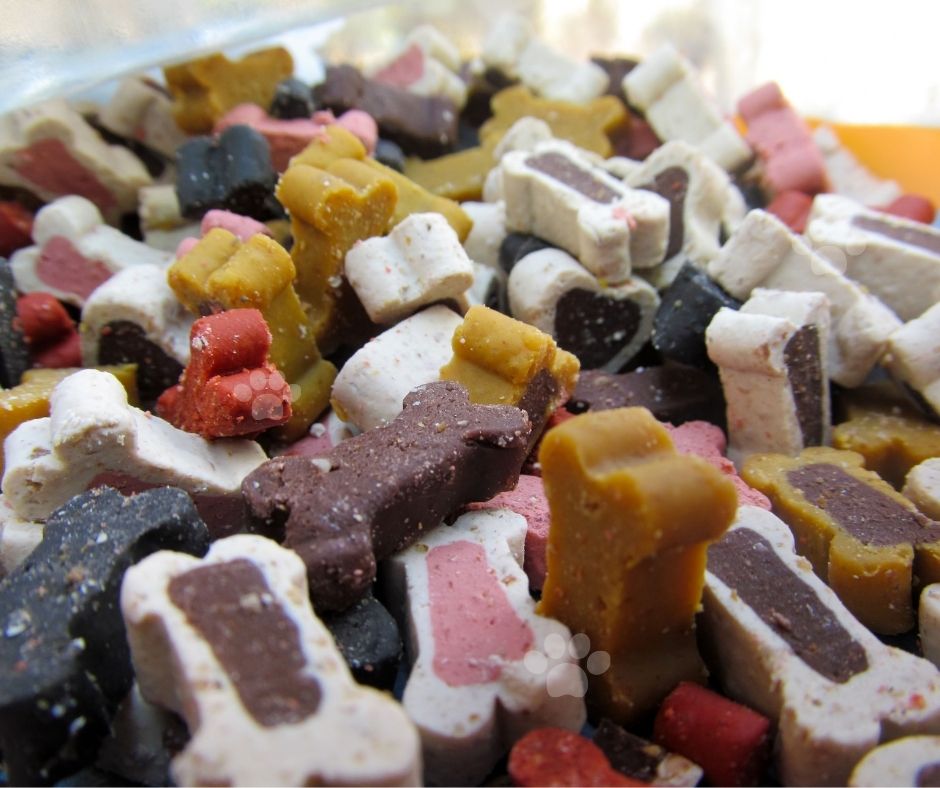
Everyone likes treats and our dogs are no different. They make great training aids and can form part of your dog’s healthy diet as long as they are kept to no more than 10% of their daily food intake.
There are lots of commercial treats on the market but you can also use some things from the fridge like chopped up chicken or turkey breast. Lower calorie options such as apple, melon and cooked or raw carrot pieces are also good choices.
Never give your dog cooked bones, especially chicken or turkey bones as they can splinter internally and cause serious life-threatening health issues.
Things To Take Away
Hopefully, you now know how to feed a German Shepherd puppy and you don’t feel quite so daunted by the prospect of making sure you do it the right way.
I know we all want to do what is best for our furry friends as they are so dependent on us to get it right.
It is important to make sure we give them the best quality nutrition we can afford but it’s also not something we should worry ourselves silly over.
Unless there is a very good reason not to then the easiest solution is to continue with the food the breeder was using. Reputable breeders will already have done their research into the best puppy food to feed to provide their puppies with the best start in life.
If that’s not an option or you don’t like their choice of food for one reason or another then the person you should speak to is your vet. They can and will give you some recommendations on food to get.
I did both. I continued with the food the breeder had been using and then asked my vet and as it happens the vet recommended the same brand. If your vet recommends a different brand from your breeder then ask them why. Their answer should help you make a decision on what to do. If you do change your puppy’s feed to a different brand remember to do it gradually over a period of 7 days to avoid any tummy upsets.
I hope this article has helped you learn how to feed your German Shepherd Puppy and realise that it is not so overwhelming afterall. If you have any questions then please feel free to ask them in the comments. I will be happy to help.
